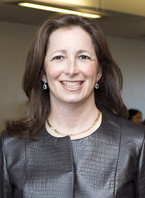Hundreds of U of T students and postdoctoral fellows will benefit from $6.6 million in funding from the Natural Sciences and Engineering Council’s CREATE program, which trains the next generation of researchers to tackle Canada’s most pressing scientific challenges.
The CREATE (Collaborative Research and Training Experience) program aims to improve the mentoring and training environment by improving communication, collaboration and professional skills, as well as providing experience relevant to both academic and non-academic research environments.
Four successful projects – two of which from U of T Engineering – will receive $1.65 million each over six years. Together, the projects will offer the equivalent of 398 student-years of training (some students will train for more than one year, so the actual number of students will be smaller).
‘Manufacturing, Materials and Mimetics (M3),’ directed by Professor Molly Shoichet (ChemE, IBBME), is based on the ideas that the next generation of cellular therapeutics will depend on engineering and manufacturing cell-based products, and that the global market for regenerative medicine is large and growing.
The project will provide students with the breadth and depth they will need for success in industry. Students will acquire hard skills by working in labs with researchers studying cell manufacturing, biomaterials and tissue mimetics. Experiential skills will come from internships in industry where they will work on product development, intellectual property or regulatory affairs. Finally, they’ll gain skills by taking courses in leadership and communications. Partners are leading Canadian companies.
“With courses available in leadership, entrepreneurship and communications, coupled with internships in industry, students will gain firsthand experience with industry, while at the same time advance knowledge in key areas of the knowledge-based economy of the 21st century,” said Professor Shoichet.

(MIE)
‘The Program in Clean Combustion Engines,’ directed by Professor Murray Thomson (MIE), will train students to become the next generation of combustion experts.
Combustion of fuels provides over 91 per cent of the world’s energy – and is the principal contributor to global warming and air pollution. Canada has many companies that develop combustion engines, and they are being challenged by increasingly strict regulations, requiring new clean combustion approaches, better fuel efficiency and alternative fuel use. The program will bring together five universities and four companies to train students who will be required by this knowledge-intensive industry.
“This grant will help train the next generation of combustion experts by establishing a new multi-university program, which has three main training features,” said Professor Thomson. “First, university-based research to provide trainees with world-class technical capabilities related to clean combustion engines. Second, a Combustion Summer School, which will include training in technical and professional skills, and lastly, an internship to provide trainees with professional experience in the industry.”
“Congratulations to the project directors, co-investigators and to the hundreds of students and postdoctoral researchers who will come together on these exciting projects,” said Professor Paul Young (CivE), U of T’s vice-president (research and innovation). “The CREATE program is important not only for our students, but for Canada. By training the students who will be the next generation of leaders in industry and academia, NSERC is investing in Canada’s future. It is these students who will tackle some of our most pressing problems, ranging from energy to health care. I look forward to seeing what they accomplish in the coming years.”



